History of Forest School
For those of you who haven’t heard the term before it’s natural to think Forest School is something fairly new. In actual fact Forest School has been around for over 100 years, although its emergence in the UK is considerably more recent. So, what is Forest School?
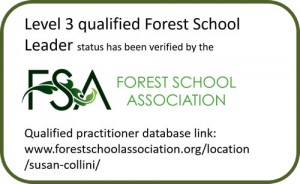 In 1993, a study group from Bridgewater College visited Denmark to observe an education model that embraced a more holistic approach than was practiced by the majority of UK education providers at that time.
In 1993, a study group from Bridgewater College visited Denmark to observe an education model that embraced a more holistic approach than was practiced by the majority of UK education providers at that time.
Subsequently, a Forest School movement was born, embracing the aims of the Denmark model; education embracing an approach that is learner-led rather than teacher-led.
In 2012 a national body The Forest School Association was established as the professional organisation for Forest School in the UK and as a governing body for training of Forest School practitioners.
Forest School is process, not a curriculum
Forest School is not another name for Bushcraft, Outward Bound, junior Bear Grylls or falls under the category of Environmental/Field studies. Forest School can involve plant and animal identification, campfire cooking, shelter building and working with tools such as knives, saws and axes, but the practical-based activities are secondary to the main purpose.
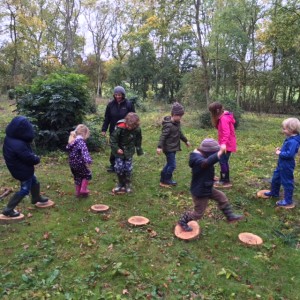 The focus of the Forest School experience is about ‘whole person’ development, gained through being involved in Forest School sessions. Participants chosen the activities they want to engage with, stemming from ‘starting points’ delivered by the Forest School Leader via a story, sounds, picture or group idea.
The focus of the Forest School experience is about ‘whole person’ development, gained through being involved in Forest School sessions. Participants chosen the activities they want to engage with, stemming from ‘starting points’ delivered by the Forest School Leader via a story, sounds, picture or group idea.
Observation by the Forest School Leader is a key aspect of sessions, the aim being to guide individuals and the group, in respect of assessing an individual’s needs in relation to risk awareness, risk management and ‘readiness’ to be given opportunity to be involved in activities that can boost self-confidence, self-esteem, resilience, concentration, verbal, social and emotional skills.
If all that sounds like waffle, take it from me the results, in terms of child development, can be very rewarding over a 6 week period and there’s considerable anecdotal evidence we’ve gathered from parents to back this up. Feedback also indicates the positive knock-on effects taken from Forest School into the school environment, especially in relation to self-confidence, self-esteem and resilience.
Time to reflect on activities engaged with at Forest School is also an important part of the sessions. Sessions start at the Forest School circle and end there too with sharing of both the practical and ‘feelings’ aspect of the session. Experiencing support and friendship and being given the opportunity to support others is a key element for holistic development.
Forest School needs to take place outdoors, which probably goes without saying, but isn’t just about establishing a connection with nature. The calming effect of just being in the outdoors is well documented and Forest School is about encouraging and promoting positive emotions, developing actions and behaviour that contribute to holistic development and wellbeing – for life.
Forest School at School
Many schools now have a Forest School setting on site, as sessions don’t actually have to take place in a Forest or woodland. Anywhere outside is fine for setting up a Forest School area, even a corner of a playground if there’s no-where else suitable.
There’s often much pressure in a School setting for Forest School sessions to produce outcomes that relate directly to the school curriculum, which is perfectly understandable. However, too much focus on curriculum-based outputs can undermine what Forest School is meant to be about.
On the plus side, In relation to Forest School run within a School, improvements in pupil’s motivation and attitude back in the classroom have been experienced and documented in research studies. These improvements are considered to be connected with the children concerned having positive experiences whilst at Forest School, delivering increased self-confidence, improved self-esteem, resilience and concentration skills.
Forest School is about taking risks
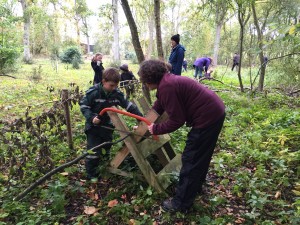 Forest School is about learning to take and manage risk, physically, emotionally and socially. This is incredibly important in a day and age where children are increasingly shielded from being allowed to indulge in unsupervised outdoor play without adult ‘interference’.
Forest School is about learning to take and manage risk, physically, emotionally and socially. This is incredibly important in a day and age where children are increasingly shielded from being allowed to indulge in unsupervised outdoor play without adult ‘interference’.
Letting your children run wild is not a risk many parents are prepared to take these days, given the stories they see, hear and read about in the media, but the consequence for children is dire. We now have a generation of children growing up who miss out on an important part of growing up; learning to manage risk for themselves.
Free play is at the core of the Forest School process, encouraging children to take small, incremental risks in relation to activities and/or social interactions. It’s important that parents understand and are ‘on board’ with the Forest School process, because they need to appreciate and accept that Forest School is not just about being outdoors and maybe getting dirty, but about teaching risk management skills.
A little word about risk assessments – they are legion for Forest School..! However, if the paperwork is right and the hazards associated with each activity carefully thought through and associated risks considered, there’s common practice established for all involved relating to protocols.
The role of the Forest School Leader
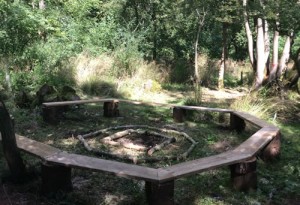 The main role of the Forest School Leader is to firstly set up the Forest School Provision to provide a risk-managed environment, to ensure those who attend are not exposed to unacceptable levels of environmental, physical, social or emotional risk.
The main role of the Forest School Leader is to firstly set up the Forest School Provision to provide a risk-managed environment, to ensure those who attend are not exposed to unacceptable levels of environmental, physical, social or emotional risk.
Secondly, the Forest School Leader needs to be a good observer, listener and facilitator, willing and able to shape the content of sessions to benefit the development and needs of those who are attending
Forest School is best delivered in blocks of at least 6 sessions, as recommended by the Forest School Association.
From my experience, one-off sessions, or less than 6 Forest School sessions run weekly, do not allow time for the individuals involved to develop any sense of community or experience the benefits through being involved in the Forest School process.
Being outdoors benefits wellbeing and readiness to learn
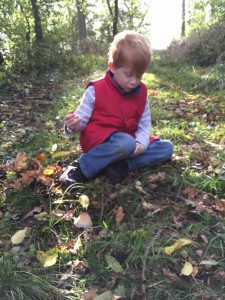 The benefits of spending time outdoors are not just to do with breathing in more fresh air. Being outdoors, with the right kit for the weather, nurtures feelings of calmness and relaxation.
The benefits of spending time outdoors are not just to do with breathing in more fresh air. Being outdoors, with the right kit for the weather, nurtures feelings of calmness and relaxation.
There’s not expectation for everyone to join in the same activity. The fact that there’s no expectation at Forest School for involvement is a freedom in itself, an important aspect that can help reduce anxiety levels and provide valuable time/space for individuals to relax and develop ‘readiness’.
OK, it could be argued that spending time essentially playing outdoors is a bit fluffy and even a waste of valuable learning time. However, we know all too well that successful learning taking place requires more than just being a passive receiver; there are other aspects that come into the equation, such as readiness to learn.
“You can lead a horse to water, but you can’t make it drink” Being ‘ready’ to learn may be less about individual choice, rather a mindset established on the back of an individual feeling comfortable, secure and valued?
What’s involved with setting up a Forest School?
Forest School Leaders need to be qualified to what’s known as a Level 3 qualification (involving a lot of study, practical assessments and many substantial written assignments).
The Level 3 Forest School Leader qualification is required to be able to obtain necessary insurance for running a Forest School, involving use of axes, knives, saws and fire. Forest School Leaders are also required to have a comprehensive Operations Handbook, First Aid qualification, food safety certificate and be police-checked.
Forest School outcomes
I’ll give you an example from a recent block of Forest School sessions. I had a child whose parent told me they were experiencing difficulties with relating to other children at school and seemed to be rather unhappy (talking to parents/carers is an important aspect of Forest School).
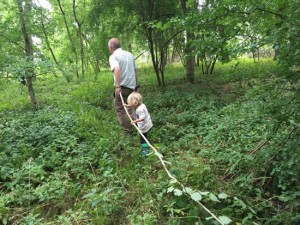 Initially the child wouldn’t make eye contact with other children or adults and tended to choose to do activities on his own. However, after putting him in a situation where he was singled out for praise in front of the rest of the group, his feelings of being a valued member of the group contributed to him being much more willing to ‘risk’ interactions with other children. Two weeks later, this same child was heard providing reassurance to another child who was unsure, saying “don’t worry, I’ll look after you”.
Initially the child wouldn’t make eye contact with other children or adults and tended to choose to do activities on his own. However, after putting him in a situation where he was singled out for praise in front of the rest of the group, his feelings of being a valued member of the group contributed to him being much more willing to ‘risk’ interactions with other children. Two weeks later, this same child was heard providing reassurance to another child who was unsure, saying “don’t worry, I’ll look after you”.
Over the 6 week block of Forest School sessions I noticed quite a change in the boy and so did his mother. What’s more, it was reported back that the school had noticed quite a change in the boy’s behaviour with other children, demonstrating more confidence in his social interactions.
Yes, it is really heart-warming to see someone ‘grow’ – it’s what I find most rewarding about being involved with the Forest School movement.
Child aged 5, speaking to his mother after a Forest School session – “I didn’t have a friend before and now I do”
Now, if you’re someone who makes friends easily then that won’t seem a big deal, but believe me, I’ve seen children who struggle with making friends really develop during a run of Forest School sessions. They feel safe in the environment, valued by the sense of community, relaxed by the lack of expectation and without consciously thinking about it, communicate positive vibes and actions that engage others.
Forest School can deliver more than you might imagine, it encourages people to extend themselves, developing their confidence to help them succeed, both at and beyond the Forest School environment..
What next?
If you have a child you feel would benefit from taking part in our Forest School sessions at Oxlip Wood, located between Thrapston and Corby, contact Susan Collini the Forest School Leader.
If you are a school wanting to dip your toe into Forest School provision, to see how it works in your setting, I am insured to deliver Forest School sessions anywhere in the UK. I can help you set up the delivery area to comply with FSA guidelines, then deliver a number of Forest School sessions in that setting. Please contact me and start a conversation.
If you’d like to keep up with news about what’s coming up, whether Forest School for children, adults, one-off craft sessions, or environmental working days, subscribe to our mailing list (leave your name and email in the box in the right hand column of the blog)
If you’re on Facebook, visit us on facebook.com/outdoortribeuk and ‘Like’ our page.
If you’re on Twitter, follow us at Twitter.com/outdoortribe

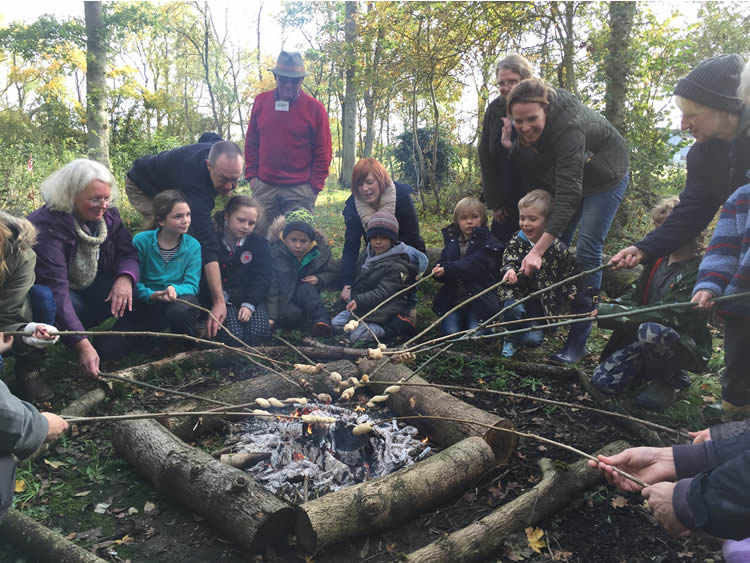
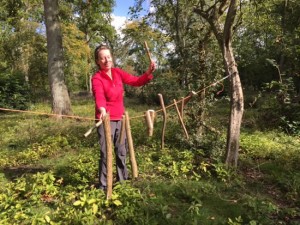
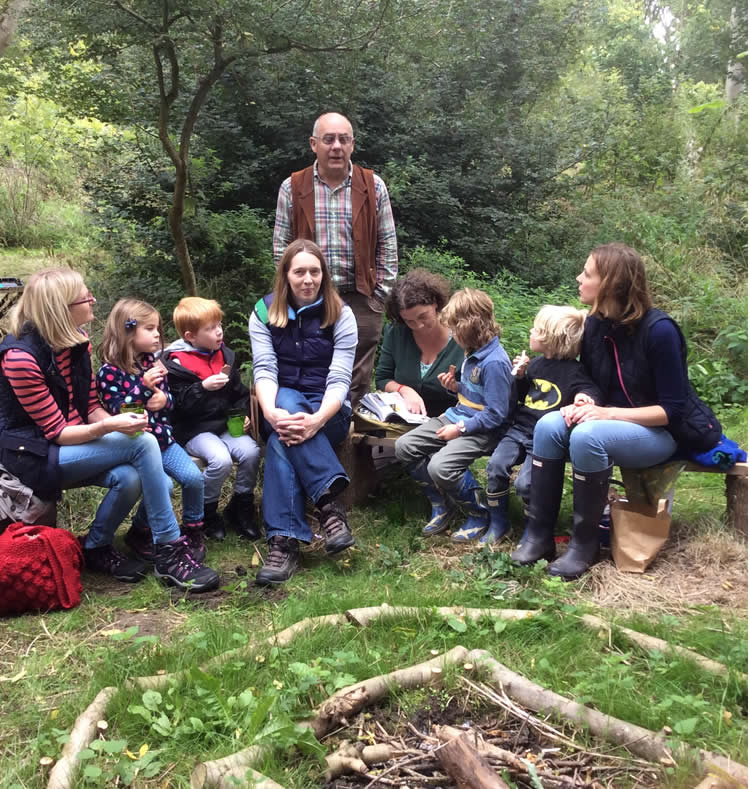

Recent Comments